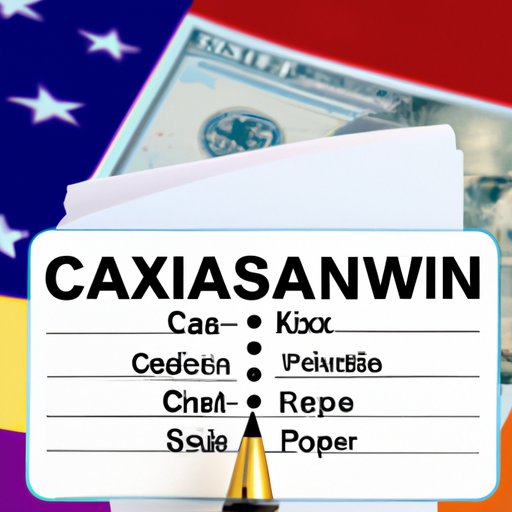I. Introduction
Indian casinos have become a significant part of California’s economy, with an estimated $8 billion in annual revenue generated by these casinos. However, the taxation of Indian casinos in California is a complex issue that has caused confusion and debate among stakeholders. This article aims to explain the ins and outs of Indian casino taxation in California, providing clarity on the laws and regulations that govern this issue.

II. Untangling the Confusion: Understanding the Taxation of Indian Casinos in California
The taxation of Indian casinos in California is governed by a patchwork of laws and regulations, which can be confusing to individuals and organizations alike. The Indian Gaming Regulatory Act (IGRA) of 1988 is the federal law that regulates Indian gaming, providing a framework for states and tribes to negotiate gaming compacts.
In California, there are currently over 100 tribal casinos operating under such compact agreements. These compacts generally outline the terms of gaming, revenue sharing, and taxation. Although tribes are generally considered sovereign entities and exempt from state taxation, these compacts often include revenue sharing agreements that provide for the distribution of gaming revenues to the state.
III. Do Indian Casinos Really Pay Taxes? A Closer Look at California’s Laws and Regulations
While Indian casinos are generally exempt from state taxation, they may still be subject to certain taxes. For example, tribes in California are required to pay special distribution funds that support specific state programs, such as emergency services and gambling addiction treatment. In addition, tribes may be required to pay taxes on non-gaming activities, such as the sale of goods and services on tribal lands.
However, the precise extent to which Indian casinos are subject to taxation in California is a matter of debate and interpretation. Some tribal leaders argue that the state is attempting to impose taxes in ways that violate the sovereignty of tribes and the IGRA.
IV. Exploring the Debate Over Indian Casino Taxation in California: Who’s Right?
The question of whether Indian casinos should pay taxes in California is a contentious one, with stakeholders on both sides of the issue arguing passionately for their positions. Supporters of taxation argue that tribes should contribute their fair share to the state’s economy, given the significant revenue generated by these casinos.
Opponents of taxation, on the other hand, argue that tribes have a unique sovereignty status that exempts them from state taxation, and that taxation would undermine this sovereignty. Litigation over taxation has resulted in several court cases that have further complicated the issue.

V. The Ins and Outs of Indian Casino Taxation in California: What You Need to Know
For individuals and organizations that interact with Indian casinos, navigating the taxation landscape can be challenging. However, there are steps that casinos must take to comply with tax laws and regulations. For example, casinos must establish clear procedures for record-keeping and reporting, in order to ensure compliance with distribution fund requirements and other taxes.
Individuals and organizations that do business with Indian casinos, such as vendors and suppliers, should also be aware of the tax implications of their transactions. Failure to comply with tax laws and regulations can result in costly penalties and legal fees.
VI. Unpacking the Impact of Indian Casino Taxes on California’s Economy
The taxation of Indian casinos in California has a significant impact on the state’s economy. A report by the California Taxpayers Association found that tribal casinos generate around $8 billion in annual revenue, with approximately $500 million in annual revenue sharing payments to the state.
These revenues support a variety of state programs and services, including education, healthcare, and public safety. In addition, the casinos provide jobs and economic stimulus to surrounding communities. For example, the Pechanga Resort and Casino in Temecula, California employs over 4,500 people and attracts millions of visitors each year.
VII. Indian Casino Taxation in California: The Pros and Cons of a Complicated System
Overall, the taxation of Indian casinos in California is a complex issue that involves a range of legal and economic considerations. While some stakeholders argue that tribes should be exempt from all forms of taxation, others argue that they should contribute their fair share to the state’s economy.
Despite the complexities of the issue, it is clear that the taxation of Indian casinos has a significant impact on California’s economy and the welfare of its citizens. While there may be debates and disagreements over the best way to approach this issue, it is critical that stakeholders work together to find solutions that are fair, equitable, and legally sound.
VIII. Conclusion
The taxation of Indian casinos in California is a complex issue that requires careful consideration and analysis. In this article, we have explored the legal framework for Indian casino taxation, clarified common misconceptions, and provided an overview of the various arguments for and against taxation.
Ultimately, the impact of Indian casino taxation on California’s economy and society is significant, and it is important for stakeholders to work together to find solutions that are fair and equitable. Whether you are an individual or organization that interacts with Indian casinos, or simply someone interested in this issue, we encourage you to read further and engage in informed discussion and debate.
